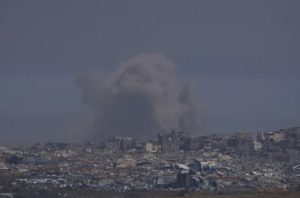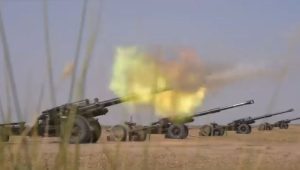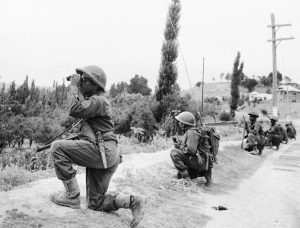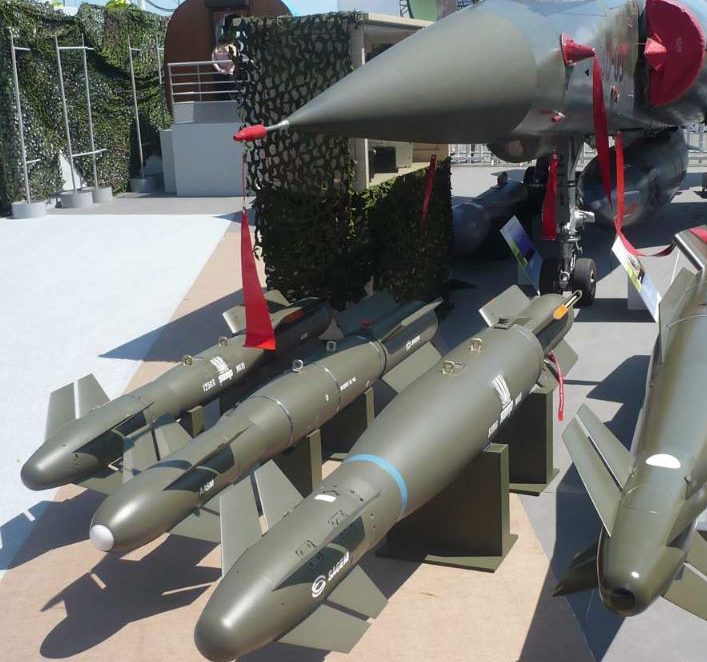India and Pakistan are like Israel and the Arabs, for ever fighting. These entities have been fighting since the day of their birth, Israel since 1947-48 and India and Pakistan also since 1947-48.
There have been periods of peace no doubt and even snatches of bonhomie, but these have been short-lived, few and far between. Tension has always loomed large on the horizon.
Mutual suspicion runs deep. India’s grouse is that the Pakistan movement prevented its dream of establishing a Greater India called Akhand Bharat which includes Afghanistan too. And Pakistanis are convinced that India’s leaders never accepted partition sincerely and that they will, for ever, plot to destroy Pakistan. Real politik might prevent such grandiose schemes from attaining fruition, but the ideas and notions on both sides are real and influence policy.
Israel, India and Pakistan were all born in the crucible of decolonisation with the British colonial power quitting the scene suddenly after World War II without adequate consultation with stakeholders, without preparation for departure and without a workable and lasting settlement of boundaries.
The Arabs never accepted Israel, a colony of persecuted European Jews, who were aliens in their midst. Indians accepted the partition of India into a Hindu-majority India and a Muslim majority Pakistan. But India would not part with Kashmir, a Muslim majority area ruled by a Hindu king. And Pakistan would never give up its claim to Kashmir, which it considers its birth right. After all, India was divided on religious lines.
The result – India and Pakistan have fought four major wars, in 1947-48, 1965, 1971 and 1999, in addition to innumerable skirmishes on the border. There have also been innumerable cross border strikes by militants, and the militaries.
The latest incident took place on May 6 (India’s Operation Sindoor). On May 7, Pakistan replied in kind. India claimed destruction of Pakistani terror infrastructure at nine places and Pakistan claimed to have downed five Indian jets. Proof is yet to be provided by the two sides though.
Every time there is a terrorist attack on India from across the border with Pakistan, India conducts a couple of air strikes to which the Pakistanis reply in kind. This has been a regular feature in the fraught relationship between the two countries since the 1990s.
Israel’s wars
The Arab-Israel story is uncannily similar. In 1948–49, Israel’s irregular army began fighting the Palestinian resistance groups and also the armies of the Arab States as the British left Palestine in a mess.
In 1956, came the Suez crisis when Egypt closed the Suez Canal precipitating a war in which it was ranged against major powers, Britain and France. Having failed to obtain its objective of bringing Israel to its heel, Eqypt unleashed the Six-Day War in 1967 but again success eluded it. Eqypt tried yet again in 1973 in what is called the Yom Kippur war, which led to a successful US and Soviet intervention. Israel, Egypt and Syria signed a peace agreement in 1974. A UN peacekeeping force was established. On March 26, 1979, Israel and Egypt made history by signing a permanent peace agreement that led to Israel’s full withdrawal from the Sinai Peninsula and to the normalization of ties between the two countries.
On June 5, 1982, increased tensions between Israelis and Palestinians resulted in the Israeli bombing of Beirut and southern Lebanon, where the Palestine Liberation Organization (PLO) had a number of strongholds. Israel invaded Lebanon. But the Israelis agreed to halt their advance and begin negotiations with the PLO.
On July 12, 2006, Hezbollah launched a barrage of rockets into northern Israel in an attempt to pressure Israel into releasing Lebanese prisoners. Israel launched an offensive into southern Lebanon to recover the captured soldiers.

In 2007, Hamas, a militant Palestinian movement, took control of the Gaza Strip. This proved to be watershed in the Arab-Israeli conflict. October 7, 2023, Hamas led the most brutal assault against Israel since its independence, killing some 1,200 people and taking more than 240 others hostage. The attack, which caught Israeli forces off guard on the solemn Jewish holiday of Shemini
Atzeret, occurred under the shadow of the 50th anniversary of the Yom Kippur War. Prime Minister Benjamin Netanyahu vowed to dismantle and destroy Hamas using “all the power” of the IDF, and the next day Israel declared a state of war.
In the weeks that followed, the IDF’s air strikes in the crowded enclave were devastating. By the end of October, when Israel launched its ground invasion, more than half of the Gaza Strip’s population had been displaced, and the war had become the deadliest for Palestinians since the war of 1948.
Despite efforts by Qatar and Egypt to mediate the return of the hostages and the cessation of violence—with short-lived success in late November—the war levelled much of the Gaza Strip and led to a calamitous humanitarian crisis. Moreover, the conflict inspired an escalation in conflict with allies of Hamas, including Hezbollah, which stepped up a series of confrontations with Israel that had begun before October 7. The Houthi movement disrupted global shipping by attacking ships in the Red Sea.
Israel faced tremendous international pressure to ease its offensive, and in February a rift emerged between Israel and the United States, Israel’s most important source of international support.
Meanwhile, efforts to reach a cease-fire between Israel and Hamas continued, although Hamas refused to accept any proposal that did not guarantee a permanent end to hostilities and the full withdrawal of Israeli forces.
India-Pakistan wars
Pakistan’s attempt to capture Kashmir in 1947-48 and in 1965 led to short wars which were brought to an end with UN intervention in 1948 and by Soviet Union’s intervention and mediation in 1965.

In 1971, India and Pakistan fought another 21- day war over alongside the liberation war of Bangladesh.
In 1972, India and Pakistan attempted to usher in a new era of peaceful bilateral relations with the Simla Agreement, which established the Line of Control (LOC) in Kashmir.
However, in 1974, the conflict took on a new dimension with the introduction of nuclear weapon by India’’, raising the stakes of any confrontation. Pakistan reached that same nuclear milestone two decades later.
Turmoil in Kashmir
In 1989, Pakistan capitalised upon a burgeoning resistance movement in Indian Kashmir to undermine Indian control. The constant dilution of Kashmir’s autonomy by successive governments in New Delhi and the rigging of elections in Kashmir, caused civil unrest which was exploited by Pakistan. It sent agents and terrorists, to help keep up the resistance against India.
1999 Kargil war
In 1999, Pakistani soldiers crossed the Line of Control in Kashmir sparking the Kargil War. The war ended with US diplomatic intervention and the withdrawal of the invading Pakistani forces.
However, the two sides regularly exchanged fire across the contested border with India accusing Pakistan of sending infiltrators.
2008 Mumbai attacks
On November 26, 2008, fears that India and Pakistan would once again head for a direct military confrontation rose after militants laid siege to the Indian capital of Mumbai. Over three days, 166 people were killed, including 6 Americans. Both India and the United States blamed the Pakistan-based Lashkar-e-Toiba (LeT), a militant group with alleged ties to the Inter-Services Intelligence (ISI)—Pakistan’s primary intelligence agency—for perpetrating the attack.
The perpetrators were brought to justice. Ajmal Kasab, the terrorist, was caught red handed, brought to trial and hanged. Plotters David Headley and Tahawwur Rana were arrested abroad. Tahawwur Rana was extradited to India.
In 2014, many hoped India would pursue meaningful peace negotiations with Pakistan after India’s newly elected Prime Minister, Narendra Modi, invited Pakistani Prime Minister Nawaz Sharif to attend his inauguration. After a brief period of optimism, relations soured in August 2014 when India cancelled talks with Pakistan’s foreign minister after the Pakistani high commissioner in India met with Kashmiri separatist leaders.
2016 Uri Army base attack
Armed Pakistani militants attacked a remote Indian Army base in Uri, near the LOC in Kashmir in 2016, killing eighteen Indian soldiers in the deadliest attack on the Indian armed forces in decades. Indian officials accused Jaish-e-Mohammad (JeM), another group with alleged ties to ISI, of conducting the attack.
Surgical strikes
In response, the Indian military announced it had carried out “surgical strikes” on terrorist camps inside Pakistani-administered Kashmir. The Pakistani military denied that any such operation had taken place.
In late 2016 and in 2018, tension on the LOC prevailed. There were 3000 cross-border strikes in 2017, while nearly one thousand were reported in the first half of 2018.
Militants launched attacks in October 2017 against an Indian paramilitary camp near Srinagar and, in February 2018, against an Indian army base in the Jammu region, which killed five soldiers and a civilian.
Kashmir civil unrest
At this time, violent demonstrations and anti-India protests calling for an independent Kashmir arose in Indian Kashmir. Over three hundred people, including civilians, Indian security forces, and militants, were killed in attacks and clashes in 2017.
After months of Indian military operations targeting both Kashmiri militants and demonstrations, India announced in May 2018 that it would observe a cease-fire in Kashmir during the month of Ramadan for the first time in nearly two decades.
2019 Pulwama attack & retaliation
In February 2019, an attack on a convoy of Indian paramilitary forces in Pulwama in Indian-administered Kashmir, killed at least forty soldiers. The attack, claimed by the Pakistani militant group JeM, was the deadliest in Kashmir in three decades. India retaliated with an air strike targeting terrorist training camps within Pakistani territory, which was followed by Pakistani air strikes on Indian-administered Kashmir.
The exchange escalated into an aerial engagement, during which Pakistan shot down two Indian military aircraft and captured an Indian MIG 29 pilot; the pilot was released two days later.
In India, Jammu and Kashmir Governor Satyapal Malick blamed the Modi government for utter negligence about security, giving rise to speculation that Pulwama was a “Flag Operation” to win the 2019 parliamentary elections. Indeed “ultra nationalist” Modi won the polls handsomely.
Abrogation of Art 370
On August 5, 2019, the Indian government revoked Article 370 of the Indian constitution that had given autonomy to Kashmir. The change removed Jammu and Kashmir’s special status, reduced its Status from a federal State to a Union Territory directly administered by New Delhi. Kashmiris were to abide by Indian property and citizenship laws, effectively diminishing their autonomy.
The ruling not only angered Kashmiris but was also viewed as a “grave injustice” by Pakistan.
Kashmir lockdown
Following the revocation of Article 370, Kashmir remained under lockdown for over a year, with internet and phone services intermittently cut off and thousands of people detained. In 2022 and 2023, the Indian central government cracked down on independent media in the region, redrew the electoral map to privilege Hindu-majority areas in Kashmir, and held a G20 tourism meeting in Srinagar with streets drained of people.

Militants attack non-Kashmiris
Targeted killings against Hindus by Islamc militants have become more frequent since 2019 forcing Hindus to flee.
Deadly clashes between Indian and Pakistani forces persisted in 2023 and 2024. Violence continued in Kashmir in response to increasing efforts by New Delhi to consolidate territorial control.
Attacks specifically targeted Indian travellers and workers in the region. In June 2024, militants opened fire on a bus carrying pilgrims traveling to a Hindu shrine in the town of Reasi. The attack killed nine and injured over thirty. In October, militants killed seven Indian workers in Kashmir at a construction site for a tunnel project connecting Kashmir to the northern region of Ladakh.
On April 22, 2025, tensions escalated after militants attacked Indian tourists in Pahalgam in Kashmir, killing twenty-six Indian nationals and one Nepalese national. The incident marked the deadliest terrorist attack in Indian territory since the 2008 Mumbai attacks.
India blamed Pakistan for harbouring the group responsible for the attack and arrested two Pakistani nationals as suspects. Pakistan denied any involvement, and its defense ministry even suggested the attack was a “false flag operation.”
Although no group has been officially identified as responsible for the attack, the Kashmir Resistance—an offshoot of Lashkar e Toiba—claimed responsibility online.
Ties downgraded
In the wake of the attack, tit-for-tat measures by India and Pakistan have driven bilateral relations to their lowest point in recent years. New Delhi first took measures to downgrade ties with Pakistan, suspending the Indus Waters Treaty, terminating a visa-free travel regime with Pakistan, and closing the Attari border crossing between the two countries.
In turn, Pakistan rejected the suspension of the water treaty, warning that any attempts to alter Pakistan’s Indus River flows would be considered “an act of war.” Islamabad also moved to close Pakistani airspace to all Indian commercial airlines, halted a special visa regime for Indian citizens, and suspended bilateral trade.
The United States and China have called for de-escalation, with Beijing advocating for an independent investigation into the attack and its suspects.
Meanwhile, India launched a crackdown in Kashmir, as Indian security forces have arrested over 1,500 Kashmiris and demolished homes of suspected militants, according to Council of Foreign Relations Global Conflict Tracker.


